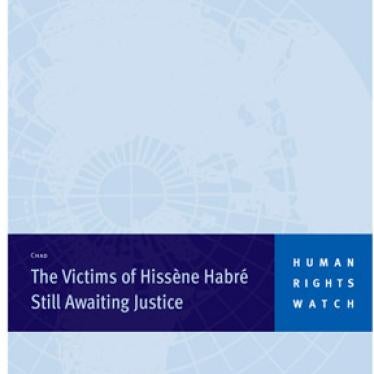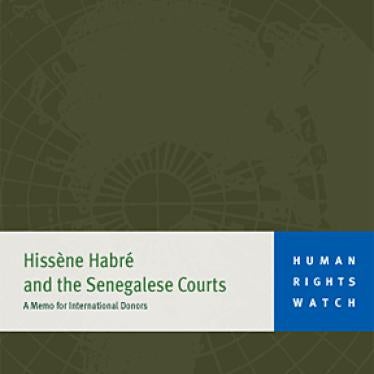(New York)- Six accomplices of Chad’s former dictator, Hissène Habré, have been removed from state security jobs in the Central African country in the last week, Human Rights Watch said today.
The Chadian government’s move follows a report last month by Human Rights Watch naming these six and 35 other leading Habré-era figures, many accused of torture and killings, who still hold key posts in Chad.
Those dismissed include the powerful director of the Judicial Police who was deputy director of national security under Habré; a surveillance chief who was the director of Habré’s dreaded political police, the Documentation and Security Directorate (DDS); and a man described by a Chadian truth commission as one of Chad’s “most feared torturers.” It is believed that more sackings may be forthcoming.
Habré, who fled Chad on December 1, 1990, was indicted in Senegal in 2000 on charges of torture and crimes against humanity. However, Senegalese courts ruled that he could not be tried in that country, where he remains in exile. Habré now faces similar charges in Belgium, where a judge is pursuing an investigation that may lead to an extradition request.
Human Rights Watch welcomed the dismissals and called on the Chadian government to allow the stalled prosecution of Habré-era officials to go forward. Cases filed against them by victims in Chadian courts are at a standstill because the judge has not been given the means or the security to allow him to investigate. Human Rights Watch also renewed its call for the government to compensate Habré’s victims, to implement recommendations made by the 1992 truth commission to construct a monument to honor the memory of the victims and to transform the former DDS headquarters and underground prison into a museum.
“The removal of some of Habré’s henchmen is an important step towards justice,” said Reed Brody of Human Rights Watch. “Now the Chadian government needs to allow their prosecution to go forward and to finally provide recognition and compensation to Habré’s victims.”
In response to the Human Rights Watch report, the former Chadian communications minister, Barthélémy Natoingar Mbainodji, stated in a BBC radio interview that “it is the wish of the Chadian government to provide compensation and to erect a monument to honor the memory of the victims of political repression under the regime of Hissène Habré,” and that he hoped that such measures could be undertaken rapidly. He also reaffirmed President Idriss Deby’s pledge to “remove all obstacles from Chad or abroad which could stand in the way” of the victims’ quest for justice.
Those officials named in the Human Rights Watch report who were dismissed this week include:
- Mahamat Wakaye, deputy director of National Security under Habré; until this week, director of the Judicial Police. Wakaye was tried but acquitted in 2003 for the asassination attempt against Jacqueline Moudeïna, the lawyer for Habré’s victims in the Chadian cases against Wakaye and other Habré-era agents;
- Amat Allatchi, director of the DDS under Habré; until this week, chief of Territorial Surveillance, Chari-Baguirmi Department;
- Warou Ali Fodou, chief of River Security of the DDS under Habré; until this week, deputy commander, Urban Corps of Adré. He was described by the truth commission as one of Chad’s “most feared torturers”;
- Gamar Daouro, deputy chief of Internal Security of the DDS under Habré; until this week, principal police inspector, Department of Control of Foreigners;
- Nodjinan Jerome, deputy chief of the DDS Research Department under Habré; until this week, deputy commander, Urban Corps of Mondou. According to the truth commission, he was part of a task force charged with rounding up members of the Zaghawa ethnic group in 1989; and
- Ali Noukouri, chief of the security of the Interior Department of the DDS under Habré; until this week, police commander for the city of Doba.
Background on the Hissène Habré Case
Hissène Habré ruled the former French colony of Chad from 1982 until he was deposed in 1990 by current President Idriss Déby and fled to Senegal. His one-party regime, marked by widespread atrocities, was backed by the United States and France, which saw him as a bulwark against Libya’s Muammar el-Qaddafi. Under President Ronald Reagan, the U.S. gave covert CIA paramilitary support to help Habré take power and remained Habré’s strongest ally throughout his rule, providing his government with massive amounts of military aid. A 1992 official truth commission report accused Habré’s regime of some 40,000 political murders and systematic torture.
Habré was indicted in Senegal in February 2000 on charges of torture and crimes against humanity, but the Senegalese courts ruled that he could not be tried there. Habré’s victims then filed complaints in Belgium under that country’s now-repealed long-arm “universal jurisdiction” law, and Senegal acceded to a U.N. request to hold Habré in Senegal pending an extradition demand. A Belgian judge and police team visited Chad in 2002, where they questioned victims and Habré-era officials, visited former prisons and took custody of the files of Habré’s dreaded political police, unearthed by Human Rights Watch in 2001.
The case was not affected by the repeal of Belgium’s “universal jurisdiction” law because an investigation had already begun and several plaintiffs are Belgian citizens. The Belgian judge is continuing his investigation and it is hoped that he will indict Hissène Habré and seek his extradition.






